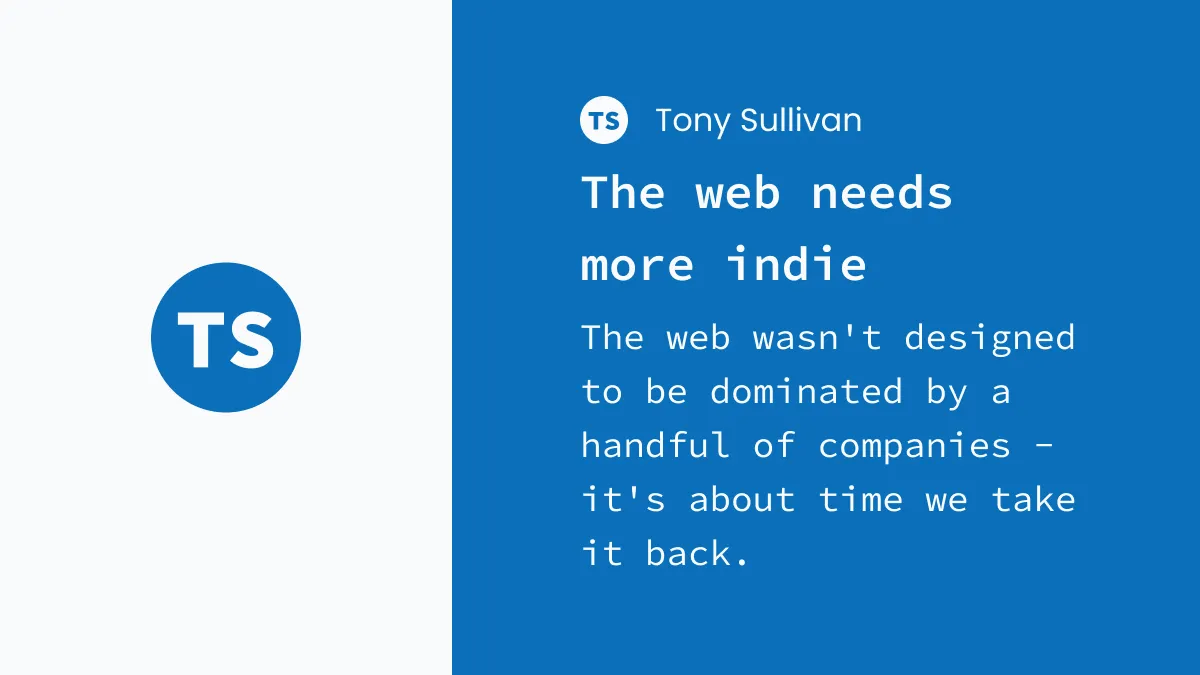The web needs more indie
4 min read
The web wasn't designed to be dominated by a handful of companies - it's about time we take it back.
I just finished reading a really interesting article Cory Doctorow published on Wired, The ‘Enshittification’ of TikTok (archive.org link). In it he outlines a surprisingly simple pattern that’s seen over and over again as platforms come and go, what I wasn’t expecting to find was how closely the pattern matches the history of the web and what the IndieWeb is all about.
Rinse and repeat
At risk of butchering Cory’s original article, I’ll try to summarize my takeaway here.
When a new platform is launched it needs users and all of the focus is on growing the user base by solving a problem and making people happy. That inevitably hits a wall, though, and focus shifts to making monetizers happy - think YouTube adding support for video monetization and cash donations. Once that revenue machine is firing on all cylinders it’s time for the platform to shift to its final challenge, making shareholders happy. The final sign of a doomed platform is looping back to making focusing on users, almost certainly after the increasingly obvious cash grab starts to erode market sentiment.
Back to the web
So what does this have to do with the web? It may not be a platform run by a multibillion dollar corporation, but the pattern is still there. The early web was largely a grass roots effort. Sure, companies were jockeying for position in the future but a vast majority of online content was put there by individuals. That was the honeymoon phase for the web, all things considered it didn’t take long for user growth to balloon.
What came next revolves around the dot-com bubble. Piles of cash were thrown at companies moving online, when that boom went bust those left standing were wondering how to actually drive revenue…simple! Advertising. The internet moved from a focus on making users happy to a focus on helping monetizers make money.
I could go on for hours talking about how centralization was inevitable at that point, but suffice it to say five big tech companies account for over half of all global internet traffic. Google, Netflix, Facebook, Apple, Amazon, and Microsoft are all publicly traded corporations that are legally bound to do what is best for their shareholders. You honestly can’t blame them at this point, but the internet has entered the last major step of extracting as much value as possible for shareholders.
Enter the IndieWeb
The IndieWeb is often brought up as a bit of whimsical nostalgia for Web 1.0. We link to the original Space Jam website, begrudge walled gardens, and throw around phrased like “own your content”.
Cory’s “Enshittification” pattern offers an interesting lens though. The web isn’t a platform driven by a corporation beholden to shareholders. There isn’t the ratchet of falling profits and a shrinking user base to push the platform back to appeasing users.
At it’s core the IndieWeb is an attempt to reclaim the internet, to pull focus back to the users. We need more people publishing their own content on their own website. We need to claw back online shopping from Amazon, ordering from a company’s own site will push more businesses to build their own e-commerce shops.
Jump right in
…the water’s nice! If you’re interested in building your own site, avoid the rabbit hole of what tools you should use and Just Ship It™. Not interested in managing your own site? Give ghost a look for an easy way to get started (I’m not affiliated to ghost at all, I just like what they do). It really doesn’t matter how you setup your site, just get out there and share your thoughts and ideas on your own site instead of feeding the algorithmic social media machine.
